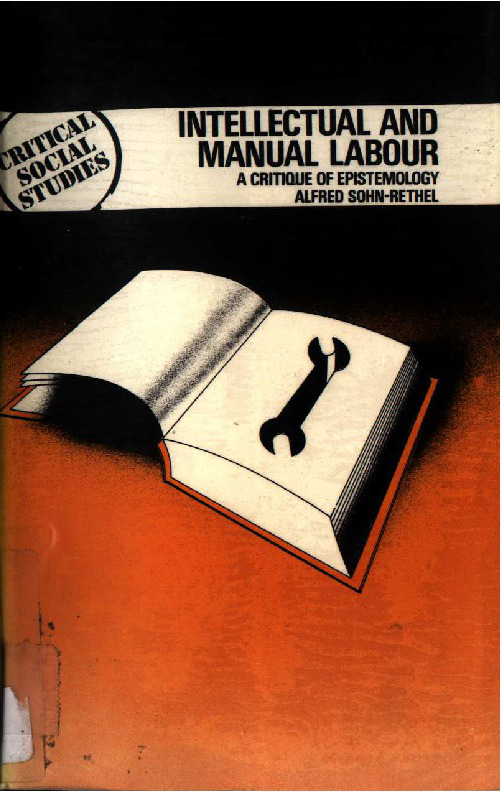Alfred Sohn-Rethel: Intellectual and Manual Labour: A Critique of Epistemology (1970–) [DE, EN, ES, PT]
Filed under book | Tags: · capitalism, commodity fetishism, economics, epistemology, Frankfurt school, knowledge, labour, marxism, philosophy, production, real abstraction, value

In this book, the economist and philosopher Alfred Sohn-Rethel attempts to “establish the relationship between the capitalist commodity form and the origin of the distinction between manual and intellectual labor. His theory of knowledge is constructed after an elaborate consideration and criticism of two schools of thought. On the one hand, he criticizes the effort of bourgeois science to assert the independent nature of science and to formulate ahistorical laws of the development of knowledge in terms of non-empirical, metaphysical characteristics of Reason. On the other hand, he also challenges orthodox Marxist theories of ideology in which knowledge is viewed as mechanistically derived from activity in the economic base.” (from a review by Gilda Zwerman, Theory and Society, 1982)
German edition
First published by Suhrkamp, Frankfurt am Main, 1970
Revised and expanded edition published by VCH, Weinheim, 1989
ISBN 352717690X
226 pages
via discofiasko
English edition
Publisher Macmillan, 1978
ISBN 0333230450
216 pages
via jlw
Commentary: Alberto Toscano (2005), N Pepperell (2007), David Black (2009), David Black (2013), Joseph Belbruno (2012), Ross Wolfe (2014).
New English edition in preparation
Geistige und körperliche Arbeit (German, revised ed., 1970/1989)
Intellectual and Manual Labour (English, 1978, 7 MB, OCR’d version added on 2014-5-4 via Marcell Mars)
Trabajo intelectual y trabajo manual (Spanish, 1979)
Trabalho espiritual e corporal (Portuguese, trans. Cesare Giuseppe Galvan, HTML, undated, unpaginated)
Michael Polanyi: The Tacit Dimension (1966–) [EN, DE]
Filed under book | Tags: · epistemology, gestalt theory, knowledge, knowledge production, philosophy, philosophy of science, science, tacit knowledge

“‘I shall reconsider human knowledge by starting from the fact that we can know more than we can tell,’ writes Michael Polanyi, whose work paved the way for the likes of Thomas Kuhn and Karl Popper. The Tacit Dimension argues that tacit knowledge—tradition, inherited practices, implied values, and prejudgments—is a crucial part of scientific knowledge. This volume challenges the assumption that skepticism, rather than established belief, lies at the heart of scientific discovery.”
Publisher Doubleday, Garden City/NY, 1966
104 pages
via James L. Kelley
Commentaries: Steven Shapin (London Review of Books, 2011), CP Goodman (Polanyiana, 2003)
Wikipedia
The Tacit Dimension (English, 1966, no OCR, pp 96-97 missing)
Implizites Wissen (German, trans. Horst Brühmann, 1985, no OCR)
Isabelle Stengers: The Invention of Modern Science (1993–) [EN, PT]
Filed under book | Tags: · apparatus, epistemology, event, fact, fiction, history of science, mathematics, philosophy of science, physics, politics, science, sociology, theory, truth

The so-called exact sciences have always claimed to be different from other forms of knowledge. How are we to evaluate this assertion? Should we try to identify the criteria that seem to justify it? Or, following the new model of the social study of the sciences, should we view it as a simple belief? The Invention of Modern Science proposes a fruitful way of going beyond these apparently irreconcilable positions, that science is either “objective” or “socially constructed.” Instead, suggests Isabelle Stengers, one of the most important and influential philosophers of science in Europe, we might understand the tension between scientific objectivity and belief as a necessary part of science, central to the practices invented and reinvented by scientists.
First published in French as L’Invention des sciences modernes, La Découverte, Paris, 1993.
English edition
Translated by Daniel W. Smith
Publisher University of Minnesota Press, 2000
Theory Out of Bounds series, 19
ISBN 0816630569, 9780816630561
185 pages
Review (Robert Evans, Contemporary Sociology, 2002)
Commentary (Stephen Shaviro, 2004)
Publisher (EN)
Google books (EN)
The Invention of Modern Science (English, trans. Daniel W. Smith, 2000)
A invenção das ciências modernas (Portuguese, trans. Max Altman, 2002)

